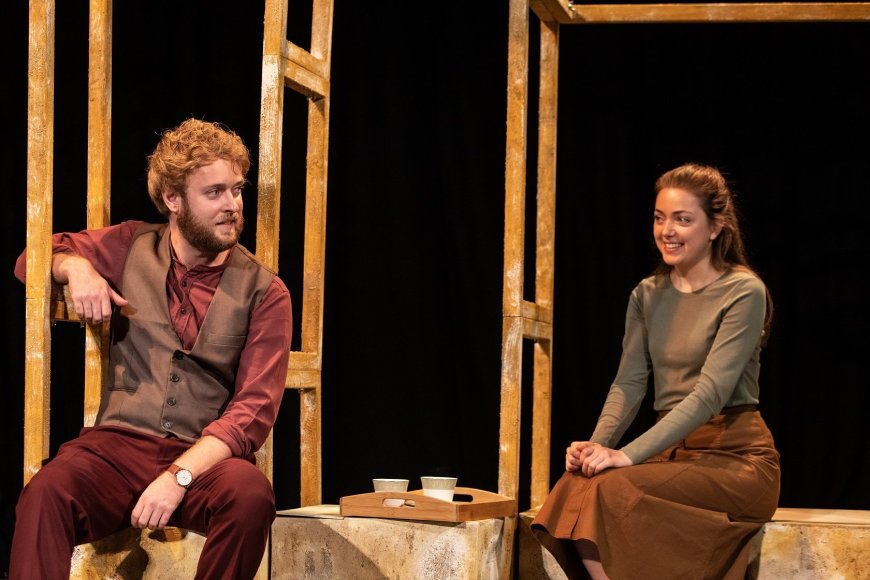Theatrical Niche bring their version of Chekhov’s Uncle Vanya into London (at the New Wimbledon Studio 19 – 23 November, and the Old Red Lion in Islington 2 – 7 December).
I asked company director Venetia Twigg to tell me a bit more about the production and future plans for the Kent-based company.

Uncle Vanya is one of the best known of Chekhov’s works, and one of the most staged. What does your production bring to it that is new?
VT: Our production focuses tightly in on the five central characters and their spiralling relationships over the course of the play – so there are just five actors involved. It is therefore much faster than usual, and is laced with a metaphor of care (of both our world and each other).
We use physical theatre to explore the bee-like worker roles Vanya and Sonia take on, and a contagion of dissatisfaction & despair; mirroring the conservational element of bee decline. There are hints of these themes across the sound, set and lighting design as well.
We have a very strong, mainly female creative team, and at the head of this is director Nadia Papachronopoulou, so we have definitely approached it from a more female perspective whilst keeping it timeless … which has led to some interesting thoughts about Sonia and Yelena in their roles within the household & society, both at the time of writing and now.
It’s also been intriguing to discover how much male mental health is talked about in the show, and how deeply & darkly both Vanya and Astroff really do plunge into this during our production.
Your company has toured a wide range of material since 2012, with Ibsen, Wilde, Berkoff, and of course Blood Wedding in the repertoire. Do you see yourselves as new interpreters of the classics more than engagers with more modern works?
VT: Yes, we seem to have ended up that way! We started with a modern American play by David Auburn (Proof), which we dearly loved, and also staged a fab Neil Simon but in between we were more experimental with Sebastian Rex’s adaptations of Woyzeck & Macbeth, and the company began to take on a more dynamic identity, until Alice Sillett came in to direct Blood Wedding.
We then took advantage of Lorca’s love of the poetic (and his interest in puppetry actually) and got into our stride with using what are seen as modern techniques (but often aren’t) that are either based on the playwright’s original intentions, or serve the themes of the story most effectively.
We had “death”, “the moon” and “the woodsmen” as puppets in blood wedding for example, and then Commedia masks and movement for the Moliere we did, and even the Wilde (the characters sat perfectly with Commedia archetypes because Wilde was following well-observed comedy traditions, and Moliere directly took from Commedia).
So yes, in a nutshell – we adapt classics using a variety of techniques, and that’s our niche now. This is a continued privilege because classics are so for a reason, they are beautifully written, and always an utter joy.

A key aspect of Theatrical Niche’s work is education workshops. Can you expand a bit more on how these allow engagement with your shows?
Yes – the workshops are a lot of fun. We mainly do free workshops for group ticket-holders, but often make bespoke educational creations for schools or universities who are studying the text or playwright too.
What has been so natural & successful about the whole workshop process is that we literally take exact rehearsal techniques that the professional actors have been using to create character, movement etc., and ask the participants to go through the same.
Everyone is treated just as the professionals are, and similarly wonderful results are expected.. And often we get such brilliant creativity from the fresh minds amongst the workshops that we wished they had been around earlier to chip in!
Anyway, those who take part will then spot those same techniques in action during the show, so they know exactly how it was created, and have those insights to take away with them, pass on – and hopefully use to create their own work with.
You seem to be a company constantly punching above its weight with reviews discussing both technical and textual innovations in your shows: where is Theatrical Niche heading as it approaches its tenth anniversary?
That’s very kind thank you! Ah gosh, time shoots on by doesn’t it.
For 2020, we are returning to Moliere in the Autumn with The Misanthrope – which is actually less based on Commedia archetypes, and more on emotional journeys and character development (whilst still being very funny!)
It also throws up some brilliant questions about who we are, and what we are willing to compromise in order to get what we want. With funding, we also hope to make this show more accessible – using audio description where we can.
After that, there are several ideas in the mix but mainly – I hope we get to work with some of the wonderful artists who have brought us this far again! I hope we will expand as a company and take them with us.
These London runs have been a long time coming but aren’t possible without both Arts Council and philanthropic support (the immense Ian Taylor in this case). Most of all, I hope that we continue to find ways to sustain the art, the artists behind it – and get it out there (at low cost) to audiences across the UK & Ireland, and with a great deal of luck/perseverance/guidance: even further afield.

My thanks to Venetia for her time.
You can book for the London run of Uncle Vanya and find out more about Theatrical Niche by visiting their website and social media.

